EP 590 The Supreme Court Just Made Gun Law Changes More Difficult Going Forward
 Remember the Alanis Morrisette song, “Isn’t It Ironic”, well that fits the notion of trying to reform gun laws in America. On virtually the same day as Congress passed a series of measures, not curtailing the types of guns available on America’s streets or universal background checks, but modest measures to help cut back on the routine assault on children and others across the country by those using guns, the U.S. Supreme Court in the decision in New York Rifle and Pisol vs. Bruen case elevated the Second Amendment to a position in which regulation of this protected and prescribed activity will become that much harder over time. The Supreme Court’s actions will insure that many states which have strict gun laws, like New York and California, will have challenges put forward to these measures. Joining us for a textured conversation on a complicated, historically significant issue is Joseph Blocher, a professor of Law and co-director of the Center for Firearms Law at Duke University. He’s terrific.
Remember the Alanis Morrisette song, “Isn’t It Ironic”, well that fits the notion of trying to reform gun laws in America. On virtually the same day as Congress passed a series of measures, not curtailing the types of guns available on America’s streets or universal background checks, but modest measures to help cut back on the routine assault on children and others across the country by those using guns, the U.S. Supreme Court in the decision in New York Rifle and Pisol vs. Bruen case elevated the Second Amendment to a position in which regulation of this protected and prescribed activity will become that much harder over time. The Supreme Court’s actions will insure that many states which have strict gun laws, like New York and California, will have challenges put forward to these measures. Joining us for a textured conversation on a complicated, historically significant issue is Joseph Blocher, a professor of Law and co-director of the Center for Firearms Law at Duke University. He’s terrific.
Podcast: Play in new window | Download
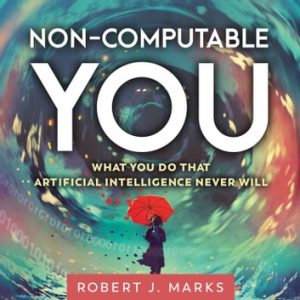 While artificial intelligence is remarkable(right, Alexa?) it is a stretch to believe the science fiction portrayals of future humans being replaced by artificial intelligence is likely…ever. The key reason, according to our guest on this podcast, is because artificial intelligence is based on algorithms and algorithms are mathematical in nature, requiring a human to program the robots to do stuff. Despite a Google engineer’s recent representation that what the company was working on was a sentient robot, that just does not seem possible. He was fired recently, by the way. And while there is an AI church forming a cult religion around this subject, there are aspects of human intelligence, things for example that composers, painters and novelists do, that will never be replicated by a machine, even one programmed by the smartest engineers in the world. Our guest, Robert J. Marks II is a distinguished professor of Engineering at Baylor University. He has worked in the field of artificial research for more than three decades. In his book “Non-Computable You: What You Do That Artificial Intelligence Never Will” he separates the exciting possibilities for artificial intelligence, from heady claims that are provably overblown. It’s a fascinating topic and a compelling listen.
While artificial intelligence is remarkable(right, Alexa?) it is a stretch to believe the science fiction portrayals of future humans being replaced by artificial intelligence is likely…ever. The key reason, according to our guest on this podcast, is because artificial intelligence is based on algorithms and algorithms are mathematical in nature, requiring a human to program the robots to do stuff. Despite a Google engineer’s recent representation that what the company was working on was a sentient robot, that just does not seem possible. He was fired recently, by the way. And while there is an AI church forming a cult religion around this subject, there are aspects of human intelligence, things for example that composers, painters and novelists do, that will never be replicated by a machine, even one programmed by the smartest engineers in the world. Our guest, Robert J. Marks II is a distinguished professor of Engineering at Baylor University. He has worked in the field of artificial research for more than three decades. In his book “Non-Computable You: What You Do That Artificial Intelligence Never Will” he separates the exciting possibilities for artificial intelligence, from heady claims that are provably overblown. It’s a fascinating topic and a compelling listen.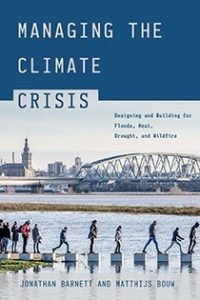 : In 2021, the United States experienced 20 weather and climate disasters, each costing more than a billion dollars to repair. As we wait for world leaders to engage their citizens in an honest conversation about how perilous our current course is, we all must take actions to get us through the next thirty years. Without any question, in this time frame we will continue to see seven major climate-related threats facing the United States: flooding along coastlines, river flooding, flash floods, drought, high heat, wildfires and food shortages. Our guest makes a compelling case that actionable policies that address all types of climate disasters are urgently needed to protect people’s lives and livelihoods. In their book, “Managing the Climate Crisis: Designing and Building for Floods, Heat, Drought, and Wildfire”, design and planning experts Matthijs Bouw and our guest, Jonathan Barnett show how communities can use a combination of engineered and nature-based solutions to deal with the constellation of problems caused by trapped greenhouse gases. While I press for a more concerted international policy response, our guest continues to come back to take steps now in our homes, cities and states before matters get much worse. And they are already worse than most people want to admit.
: In 2021, the United States experienced 20 weather and climate disasters, each costing more than a billion dollars to repair. As we wait for world leaders to engage their citizens in an honest conversation about how perilous our current course is, we all must take actions to get us through the next thirty years. Without any question, in this time frame we will continue to see seven major climate-related threats facing the United States: flooding along coastlines, river flooding, flash floods, drought, high heat, wildfires and food shortages. Our guest makes a compelling case that actionable policies that address all types of climate disasters are urgently needed to protect people’s lives and livelihoods. In their book, “Managing the Climate Crisis: Designing and Building for Floods, Heat, Drought, and Wildfire”, design and planning experts Matthijs Bouw and our guest, Jonathan Barnett show how communities can use a combination of engineered and nature-based solutions to deal with the constellation of problems caused by trapped greenhouse gases. While I press for a more concerted international policy response, our guest continues to come back to take steps now in our homes, cities and states before matters get much worse. And they are already worse than most people want to admit. When our guest knocked on one door of a voter in her rural Maine district, his first question was are you a Republican or a demon? Hmm…nice opener. The FDR coalition, a mainstay of American politics throughout much of the 20th century, has fallen apart. Less educated, rural voters have abandoned the Democratic Party. However, suburban, white women and growing minority groups have replaced those voters in a new Democratic coalition. Chloe Maxmin, a current State Senator(D)from a rural district in Maine, and a self-described progressive, thinks the party is making a big mistake not trying to attract these voters, as she has. With her campaign manager, Canyon Woodward, hey describe how to earn back the rural vote in their book “Dirt Road Revival”. We have a spirited conversation about whether what she’s done in Maine is applicable to other states and whether it is really worth the focus when there are other voters, moderates and independents, turning away from the Republican Party.
When our guest knocked on one door of a voter in her rural Maine district, his first question was are you a Republican or a demon? Hmm…nice opener. The FDR coalition, a mainstay of American politics throughout much of the 20th century, has fallen apart. Less educated, rural voters have abandoned the Democratic Party. However, suburban, white women and growing minority groups have replaced those voters in a new Democratic coalition. Chloe Maxmin, a current State Senator(D)from a rural district in Maine, and a self-described progressive, thinks the party is making a big mistake not trying to attract these voters, as she has. With her campaign manager, Canyon Woodward, hey describe how to earn back the rural vote in their book “Dirt Road Revival”. We have a spirited conversation about whether what she’s done in Maine is applicable to other states and whether it is really worth the focus when there are other voters, moderates and independents, turning away from the Republican Party.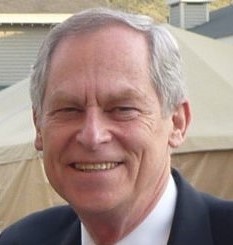 As the war in Ukraine rages, it is hard not to see the ravages of the conflict on the civilian, as well as military, population in that country. When aggressors like Russia, and in the many civil war conflicts less well reported today around the globe, care little about the impacts of indirect involvement, including communicable diseases, maternal and neonatal nutritional diseases, effects of contamination of land and sea, as well as indiscriminate attacks on civilians, it presents health problems that haunt a society for generations. If we complicate matters further, we can talk about how slowed wheat production in Ukraine can affect societies in Africa. As our guest, Dr. Barry S. Levy, reminds us in his book “From Horror to Hope”, war is a public health catastrophe. Estimates are that it will take $750 bliion to re-build the infrastructure in Ukraine in the wake of this war. Included in that number will be hospitals and other care facilities destroyed in many parts of the country. As war has moved from pitched battles between warring combatants in fields to the streets of major cities, the effects of innocent civilians has continued to grow. It’s a timely subject with growing relevance in this new age of conflict.
As the war in Ukraine rages, it is hard not to see the ravages of the conflict on the civilian, as well as military, population in that country. When aggressors like Russia, and in the many civil war conflicts less well reported today around the globe, care little about the impacts of indirect involvement, including communicable diseases, maternal and neonatal nutritional diseases, effects of contamination of land and sea, as well as indiscriminate attacks on civilians, it presents health problems that haunt a society for generations. If we complicate matters further, we can talk about how slowed wheat production in Ukraine can affect societies in Africa. As our guest, Dr. Barry S. Levy, reminds us in his book “From Horror to Hope”, war is a public health catastrophe. Estimates are that it will take $750 bliion to re-build the infrastructure in Ukraine in the wake of this war. Included in that number will be hospitals and other care facilities destroyed in many parts of the country. As war has moved from pitched battles between warring combatants in fields to the streets of major cities, the effects of innocent civilians has continued to grow. It’s a timely subject with growing relevance in this new age of conflict.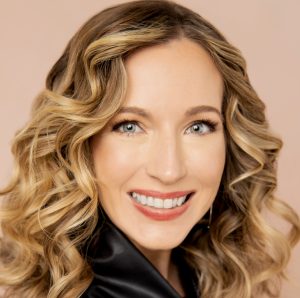 It is now said that Roe v. Wade is on the ballot. President Biden recently reiterated that sentiment saying that the future of abortion rights is now in the hands of the voting public. Abortion will remain legal in ‘blue states’ and banned altogether or largely in ‘red states’. The Congress, depending upon who controls it and who is in the White House, will be able to pass a law allowing for abortions nationwide or banning the practice. So the matter really is now a political one. To be able to frame the public’s perception of abortion, we thought it was important to look at the attitudes of the public on an issue that most people try to avoid discussing. We bring back on this podcast Tricia Bruce, PhD., from the McGrath Institute for Church Life at the University of Notre Dame. She was the lead researcher on a study done in 2019 titled “How Americans Understand Abortion.” Through in-depth interviews with people in red and blue states she found that the attitudes on abortion are more textured and more personal than has been described in our political discourse. How that all plays out politically is hard to say, but important to understand. Listen in and expect to be surprised.
It is now said that Roe v. Wade is on the ballot. President Biden recently reiterated that sentiment saying that the future of abortion rights is now in the hands of the voting public. Abortion will remain legal in ‘blue states’ and banned altogether or largely in ‘red states’. The Congress, depending upon who controls it and who is in the White House, will be able to pass a law allowing for abortions nationwide or banning the practice. So the matter really is now a political one. To be able to frame the public’s perception of abortion, we thought it was important to look at the attitudes of the public on an issue that most people try to avoid discussing. We bring back on this podcast Tricia Bruce, PhD., from the McGrath Institute for Church Life at the University of Notre Dame. She was the lead researcher on a study done in 2019 titled “How Americans Understand Abortion.” Through in-depth interviews with people in red and blue states she found that the attitudes on abortion are more textured and more personal than has been described in our political discourse. How that all plays out politically is hard to say, but important to understand. Listen in and expect to be surprised.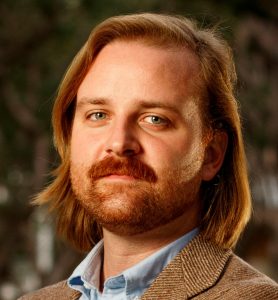 The answer is nothing really unless you are looking to enrich incumbent property owners, institutionalize segregation and contribute to sprawl. That’s according to our guest, M. Nolan Gray, author of “Arbitray Lines”. He’s a professional city planner and an expert in land-use regulation. And while there are plenty of reasons to plan for diverse, inviting communities, the use of zoning is not a great tool in that effort. In the cities, it often limits the robust, multi-purpose neighborhoods of old that had a mix of housing types, small businesses and recreation areas to make life fulfilling without a car. And in the suburbs, while at times it may have some applicability to health and safety concerns with wells and septic systems, often zoning is used to excluded different types of people from finding their home in these communities. This could include limits on young people, the elderly and minority. Our guest explains why zoning is not to be equated with city planning and that it is not the only kind of land use regulation. In fact, he argues for its abolition.
The answer is nothing really unless you are looking to enrich incumbent property owners, institutionalize segregation and contribute to sprawl. That’s according to our guest, M. Nolan Gray, author of “Arbitray Lines”. He’s a professional city planner and an expert in land-use regulation. And while there are plenty of reasons to plan for diverse, inviting communities, the use of zoning is not a great tool in that effort. In the cities, it often limits the robust, multi-purpose neighborhoods of old that had a mix of housing types, small businesses and recreation areas to make life fulfilling without a car. And in the suburbs, while at times it may have some applicability to health and safety concerns with wells and septic systems, often zoning is used to excluded different types of people from finding their home in these communities. This could include limits on young people, the elderly and minority. Our guest explains why zoning is not to be equated with city planning and that it is not the only kind of land use regulation. In fact, he argues for its abolition.
 The child welfare system is, we are told, in place to protect children from abuse. In fact, the inordinate number of interventions in Black families suggests that the touted benevolence has turned into significant overreach tearing these families apart and thrusting children into a foster care system known to cause devastating harms. Often the crime these families have committed is not negligence or abuse but the sad fact of being poor in a nation whose safety net is far from adequate to address many of the needs that families and children have. Our guest, Dorothy Roberts, the George A. Weiss University Professor of Law and Sociology at the University of Pennsylvania has written a bold new book, “Torn Apart: How the Child Welfare System Destroys Black Families–And How Abolition Can Build a Safer World.” Professor Roberts is a respected and controversial figure as she calls for radical change. Some might call it taking apart the current system root and branch. Rather than providing protective services for children she has coined the term the ‘family policing system’ to better describe what is going on when there are now interventions of one sort or another in over fifty percent of Black families. So if we abolish the child welfare system, what will we replace it with? Find out on this podcast
The child welfare system is, we are told, in place to protect children from abuse. In fact, the inordinate number of interventions in Black families suggests that the touted benevolence has turned into significant overreach tearing these families apart and thrusting children into a foster care system known to cause devastating harms. Often the crime these families have committed is not negligence or abuse but the sad fact of being poor in a nation whose safety net is far from adequate to address many of the needs that families and children have. Our guest, Dorothy Roberts, the George A. Weiss University Professor of Law and Sociology at the University of Pennsylvania has written a bold new book, “Torn Apart: How the Child Welfare System Destroys Black Families–And How Abolition Can Build a Safer World.” Professor Roberts is a respected and controversial figure as she calls for radical change. Some might call it taking apart the current system root and branch. Rather than providing protective services for children she has coined the term the ‘family policing system’ to better describe what is going on when there are now interventions of one sort or another in over fifty percent of Black families. So if we abolish the child welfare system, what will we replace it with? Find out on this podcast